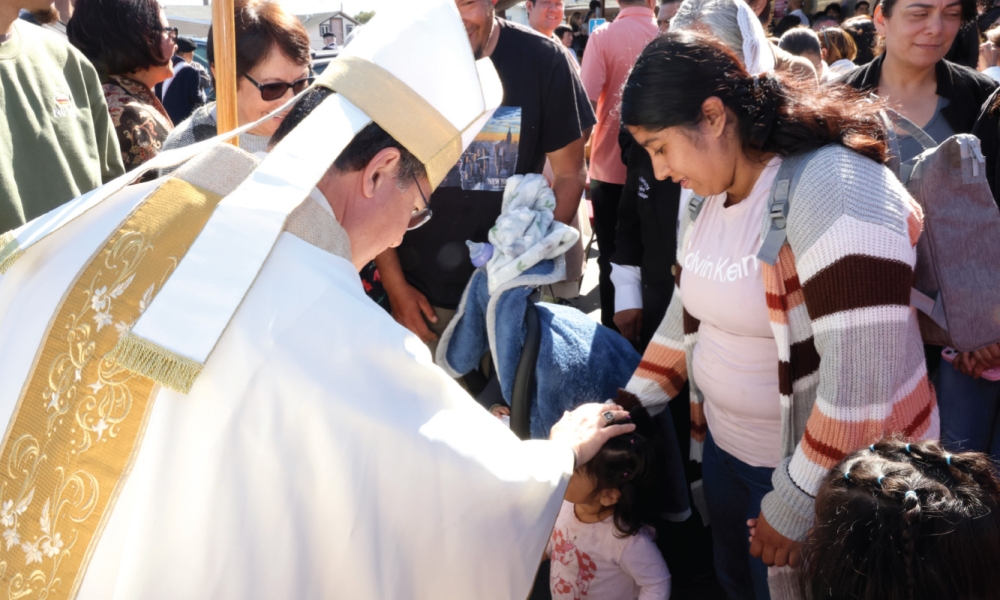
Dear Brothers and Sisters in Christ - Summer 2024
Dear Brothers and Sisters in Christ,
Over the past few months, the Diocesan Pastoral Plan Implementation Team and I have been hosting monthly conversations with clergy, which focused on the crucial issue of hospitality, an objective in the worship priority of our Pastoral Plan.
Dear Brothers and Sisters in Christ,
Over the past few months, the Diocesan Pastoral Plan Implementation Team and I have been hosting monthly conversations with clergy, which focused on the crucial issue of hospitality, an objective in the worship priority of our Pastoral Plan.
These discussions have treated various aspects, including, but not limited to what parishioners experience before, during, and after Sunday liturgy, the user-friendliness of our parish/school websites, the accuracy of the information on signage and social media, as well as the provisions for persons with special needs. These conversations have sparked a commitment among our priests and staff to more intentional approaches to presenting a more welcoming face of the Church to our visitors and attendees.
Hospitality prepares us for the outreach priority of the pastoral plan, which is the focus of this issue and includes the work of evangelization, justice, and service. Pope Francis recently remarked, “Spontaneous hospitality and thoughtful gestures communicate something of God’s love.” He also shared that "a willingness to listen to other Christians, paying attention to their personal stories of faith and the history of their community” is at the heart of all ecumenical dialogue. It is also the heart of all Christian evangelization.
Hospitality is an essential step in implementing our pastoral plan. As a diocese, we are committing in the coming months and years to inviting and listening to people who are not engaged in our Catholic communities, those who are not Catholic or have drifted away from the Church. We need to ensure that we provide a hospitable face of the church to people who approach our communities and to those whom we serve.
We often think of evangelization as us speaking about our faith and the Church. However, if we look at the example of Jesus himself, we see that effective witnessing of our faith begins with listening. In Jesus’ encounter with the two disciples on the road to Emmaus (Lk. 24:13-35), he first listened to the disciples before he began to teach them or break bread with them. Jesus was patient and listened. Even though the understanding of the two disciples was erroneous, Jesus listened. Genuinely listening to someone sends a powerful message, showing that we care about them and take them seriously. Listening often changes the attitude of the person being listened to: it opens a door to their heart — an open door that usually allows God’s grace to operate.
I invite all of us to consider the following first step as we read this issue: let us dedicate some time, as Jesus did, to listening to someone who is not practicing our Catholic faith. We all know someone who has drifted away from the Church or someone who feels hurt by the Church or society. When we genuinely listen to someone, we create a space for God’s mercy and love to act and take hold in their hearts and ours. All relationships begin when we listen with love and compassion, even if we don’t see eye to eye. While this initial phase of evangelization is vital, it is just the beginning. Accompaniment must follow, and this topic will be further addressed under the family priority of the Pastoral Plan in a future issue.
Eastern church iconography often depicts saints with large eyes, large ears, and small mouths: a reminder to us to observe discerningly, listen carefully, and speak sparingly. There is great wisdom in this. Let’s be protagonists in the Holy Spirit's work of evangelization, in which we participate by opening our ears to God and to others so that we might draw close to God in our hearts and help the hearts of others to also draw near to God’s love and grace.
Bishop Oscar Cantú


